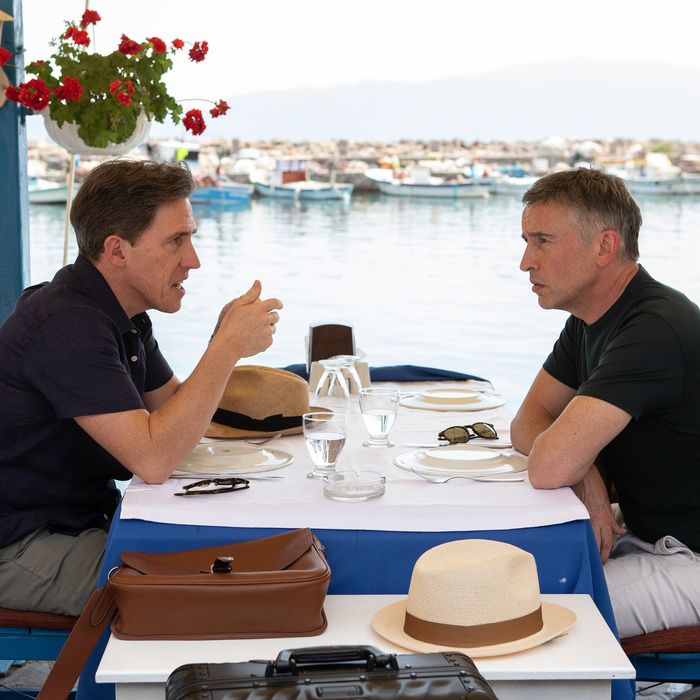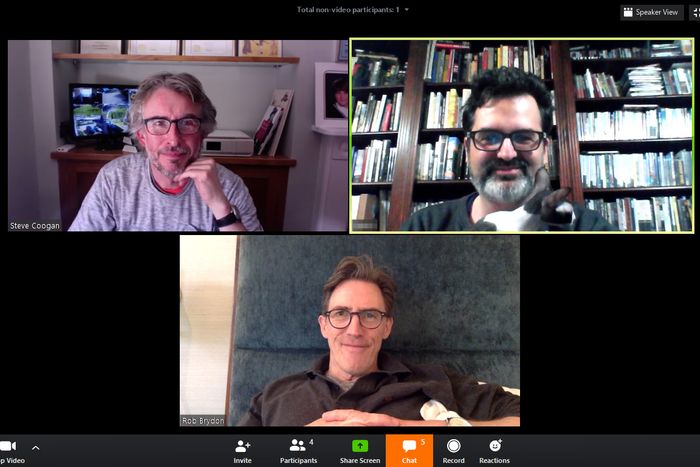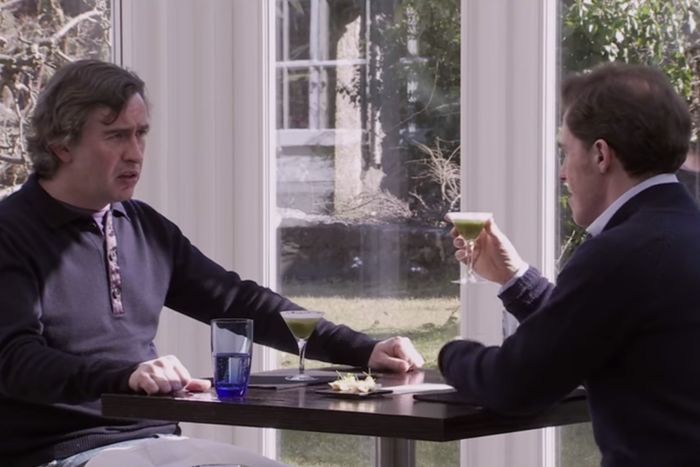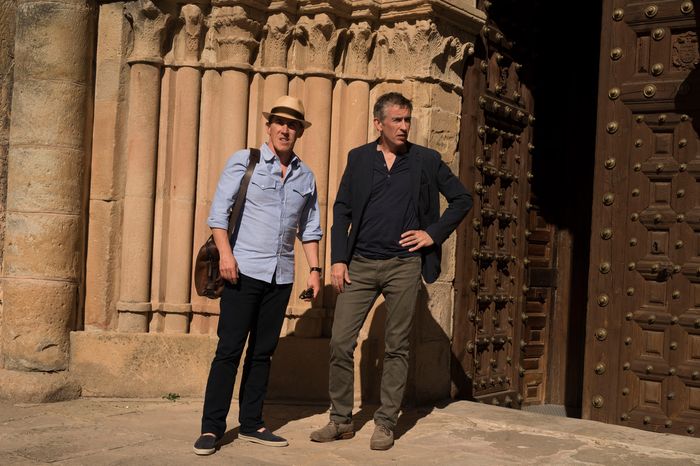
Though I’ve long been a fan of the Trip films, I was not prepared to get emotional over the announcement of a new one. Learning of the impending May release of The Trip to Greece — the fourth and final entry in the series that follows British comedians Steve Coogan and Rob Brydon, playing fictional versions of themselves, as they travel lovely roads, eat lovely meals, and do lovely impressions, all the while hilariously sniping at each other over personal and professional matters — led to some complicated feelings. Here was a movie about all the things we can’t do right now, not that most of us could ever really do them: Go for a long car ride in another country with a friend-colleague-rival (at least, that’s how Coogan and Brydon present themselves in these efforts), stay in a hotel, eat in a nice restaurant, and then move on to the next location.
The films, directed and conceived by Michael Winterbottom and partly improvised by Coogan and Brydon, aren’t indulgent wallows in food and privilege, however: Through the heightened, fictionalized portraits of Coogan and Brydon’s petty professional jealousies, they also interrogate the cocoon of celebrity culture. We always get the sense that reality is slowly catching up to these gents. Never has this been truer than in 2020’s The Trip to Greece, which alongside the impressions and the bickering and the delicious meals, finds Coogan and Brydon confronting the agony of the refugee crisis, as well as personal loss in their own lives. (The films all start off airing in longer series form in Britain, and Greece premiered on TV in the U.K. in February.) But for all the darkness, it still manages to be quite charming.
Coogan and Brydon have always been upfront about the fact that the two men presented onscreen are not really their true selves. (They’ve been outfitted with different families, for starters.) But when I get them together for a Zoom one dreary March morning, they slip right into (gently, collegially, lovingly) taking the piss out of each other. Brydon is at home in London. Coogan is at home in Essex, behind him a monitor displaying footage from a series of security cameras, a fact that Brydon does not leave unmentioned. Brydon is late to our chat; Coogan has noticed …
Hi, Rob.
Rob Brydon: Hi, so sorry. I totally forgot.
Steve Coogan: Well, that doesn’t entirely surprise me.
RB: It’s very hard to remember things, I find, at the moment.
SC: Because you’re rushed off your feet, are you? [Laughs.]
RB: There’s an interesting thing here. I’ve got an 11-year-old and an 8-year-old, and I think the experience at the moment of people who have young children is very different from the experience of the people who don’t. The people who don’t are watching films, reading books, it’s rather lovely.
SC: I don’t envy you. I’m being facetious. But can you go out?
RB: We go out once a day. One day we do a walk, the other day we do a bike ride. But we don’t come into contact with anyone. We’ve got a big garden, so we can be in that.
SC: You can’t cycle around your garden, can you?
RB: No, no, we cycle the streets. You can cycle the streets as long as you don’t come into contact.
SC: Isn’t that a bit hazardous?
RB: No, because the roads are so quiet.
How are you guys holding up? What the hell is life like for you?
RB: Are you alright, Steve? Are you okay?
SC: I am okay. I’m here with my daughter and her boyfriend. Just the three of us. They’re obviously quite happy with each other, and I just kind of hang out with them saying, “What are you guys doing?,” which is slightly awkward. I think they’d be fine without me here, but I’m not sure I’d be fine without them here. So, I’ve been doing that and, you know, going for runs, and Skype writing because that’s what I was doing anyway. I’m carrying on with that, and trying to imagine somehow that the things I write might still somehow be relevant in a post-corona world. I think anyone who’s pitching anything or making anything after this will claim that it’s somehow relevant to coronavirus, whatever it is. But I’m very fortunate. I did some shopping for some people, locally, and the woman asked, “Do you want some money?” And I said, “No, that’s fine. Just make some contribution to some charity.” And my writing partner said, “What you really said was, ‘Just make sure you tell people about it.’” [Laughs.] Which I’m doing now.
RB: You know what I would love now is if that as we’re doing this we see behind you, Steve, people breaking into your house and stealing your stuff on the screen, while you’re talking, unaware of what’s going on.
SC: [Glances behind him.] Security cameras! And I’m claiming that I care about the local community.
RB: [Laughs.] Like a little old woman … [inaudible].
You broke up a little bit there, Rob.
RB: It doesn’t bear repeating.
SC: Oh, come on, I like it when you’re forced to repeat a punchline after the moment’s gone.
I know a lot of people thought they’d have more time to read, and do other things, but what they’re discovering is they can’t focus on anything, due to the anxiety and stress.
SC: I think people are still in a state of shock. Because it all happened rather quickly. But when people adjust to the new reality that’s going to be here for at least a few months …
RB: I’ve actually been reading Alan Bennett’s diaries again. I find those incredibly calming and relaxing, this really lovely ordered world.
SC: I watched Brief Encounter the other day, which was really, really wonderful.
RB: I bet it moves nice and slowly. We showed the boys The Great Escape and really enjoyed it.
SC: It’s great when you can enjoy things vicariously a second time around through your children. Having said that, I just got through the second season of El Chapo and I’m looking forward to the third.
Before watching Trip to Greece this weekend, I rewatched all three previous Trip movies. I started with The Trip to Spain, and there’s that moment early on, where you’re at a restaurant, sitting outside, and it starts to rain and everybody crowds inside. It’s the kind of annoying little thing that everyone has probably experienced at some point in their lives. And yet, I started tearing up watching it, because here was this incredibly common human moment that I can’t have right now. And who knows when I’ll ever get to have it. I was surprised at how it struck me.
SC: Wow. When people come out of prison they often talk about the visceral pleasure of feeling rain.
RB: I’ve been seeing lots of things like that at the moment. I see something on television or a film, and I see people meeting somewhere, and think, Wow, that’ll be nice to be able to do that again.
I found The Trip to Greece to be quite poignant. It does seem like the saddest entry in the series. We get this sense that reality is catching up to you guys.
SC: What Michael [Winterbottom] does with Rob and I is that whatever peccadillos or idiosyncrasies we have, we just sort of build on them. Because he’s middle-aged like we’re middle-aged, so he just addresses those things. What’s the word? It takes the curse off these things. When we talk about these things, or laugh at these things, they suddenly become diminished. These big questions — the anxiety of life — become somehow just put in a box. And if you make art out of it … What’s that Nora Ephron line? “Everything is copy.”
RB: Oh, you’re speaking of Nora Ephron. You know in The Trip to Greece where I say, “I did a Skype audition,” that was for Nancy Meyers.
SC: Oh, yes, Nancy. I auditioned for her.
RB: Yeah, me too. I didn’t get it.
SC: I didn’t get it either. I auditioned for The Holiday, and she said I wasn’t sexy enough.
RB: I didn’t audition for that. No, this was a little thing. But it was very funny because she was very flattering, and of course I’m very good with flattery. I respond very well to it. And then I did my bit, and of course didn’t get it.
SC: So, basically, you peaked at the small talk.
RB: Yeah! I think I’m good at that. I very rarely get a part that I audition for.
SC: I’m the same. I remember once this director said, “Can you stop saying the name of the character when you talk about it and just say ‘I’?” Right? So when I’m writing Alan Partridge, I say, “Alan does this, and Alan does that.” I don’t say “I do this,” you know. I just say, “Alan.” And I was talking about a part with this director, saying “he,” referring to the character. “He does this and then I think he does this,” and [the director] says, “Can you stop saying ‘he’ and say ‘I’, I think it will help you.” And I found myself saying, “Fuck off.” That’s why auditioning doesn’t go well for Rob or, I’d say, me.
Do you ever hear from chefs who felt they or their food were portrayed unfairly on the show?
SC: I was at L’Enclume only two months ago. L’Enclume is in the first Trip, in the Lake District, not far from me. I went there for dinner, and the chef, Simon Rogan, who’s very much a respected Michelin star chef, came up and went, “Hey, how are you?” And it was all very friendly, but he still mentioned Ray Winstone’s snot. I don’t know if that’s in the film version [or only in the BBC series version], but there’s this one particular dish that had a green liquid in it that looked a bit like — and I don’t know how we arrived at this, I can’t remember — but I do remember that I compared it to Ray Winstone as a gangster forcing someone to eat his mucus. And for Simon Rogan, the chef … I mean this was ten years ago and whenever I see him he still brings it up in conversation. You know, we were very, very nice, and very complimentary, but it’s funny that that’s the thing that sticks in his mind about the show.
RB: We just praise the food because it’s always very nice, although I’m often not paying that much attention to it. People often say to me, “Which is the best food?” I’m just thinking, What am I going to say next? I’m trying to be inventive and creative. What I do remember are the meals we would eat in the evenings when we weren’t filming.
SC: Yeah. Do you remember, Rob, I think one of the most pleasurable meals we had was in King’s Landing. I think it was the Angel Pub in Yorkshire, and it was fried breakfast, after we had been to Bolton Abbey …
RB: It was simple ingredients.
SC: Yeah, but not the normal simple ingredients. There weren’t fresh, clean ingredients. It was a fried breakfast. It was egg, bacon, sausage, tomato, beans.
RB: But done beautifully.
SC: I remember sitting outside that pub by the road and thinking that was lovely, just … yeah. I’d go back there, you know. I’d go back there.
RB: Well, I went back to Holbeck Ghyll, which is in the Lake District, with my wife and my two younger children …
SC: Did they sit you by the window?
RB: I think, yes, we sat in the same seat, and I felt like the returning hero, and I thought, Surely we’re not going to be charged for this meal. But we were.
SC: You know what, Rob, you say that, but I have to say I have been back there several times, and my brother-in-law and my sister who both are very normal people who work in the public sector helping people with special needs, I told the proprietor and they stayed there for three nights, having Michelin-star dinners every night, and the whole thing was free.
RB: And yet one-half of the original team who made that thing has to pay. Where’s the fairness? [Laughs.]
SC: I think that it’s basically socialism in action. Those who can afford it pay. Those who can’t are subsidized. That’s fair. That’s my political worldview in action. So, it was right that you were charged.
RB: I’m struggling with it. A discount would have been something.
How often do you hear back from the subjects of your impressions?
RB: We did a thing with Michael Caine at the Albert Hall, and he was very nice. You can see it. Anthony Hopkins I met in Los Angeles and he said, [does an Anthony Hopkins voice] “I loved The Trip. Loved The Trip.” This was after we’d done the first one and the Italian one hadn’t come out. And I said, “Well, in this new one, the Italian one, we’re on a yacht and we do you in The Bounty.” And he started doing it! He started going, “Turn your back away, Mr. Fryer!” And then I was doing it back to him. We were in a car and I got rather giddy. Hopkins! Hopkins occupies a sort of Brando-like position in the business. I think he is the equal of any actor, if you look at what he has put onscreen and onstage. And there he was, and he was doing it, you know, right next to me. And I’m doing it back at him! It was all I could do not to cry. It was quite overwhelming.
SC: Gosh, yeah … I’m quite envious of that.
Has anybody you’ve done impressions of reacted negatively?
RB: I don’t think so. I think most people are flattered by it.
SC: Oh, me! That’s me. When you do me. I react slightly negatively.
RB: I do Steve Coogan and he’s a prickly customer. He doesn’t like it.
SC: [Laughs.] Probably the most negative reaction is me when he does me. That’s the truth, yeah. I do find it a little bit uncomfortable when he does it. You know how some people don’t like it when you take photographs of them, because they think you’re taking their soul? I feel like somehow it’s distilling some DNA, like a little bit of witchcraft. There’s something discombobulating about it. I don’t think it’s quite me, but there’s a certain familiarity about it. It’s reductive, that’s what it is. Because I think what I do is quite interesting, and if you do it, it’s almost like you can sort of bottle it and sell it in Boots, and that worries me, you know.
RB: And he’s telling the truth when he says that.
SC: Yes, yes. Yes. [Laughs.]
Rob, I hear that you declined to meet Al Pacino once.
RB: Yeah, that is true. I was doing The Huntsman: Winter’s War. A big hit. It exploded at the box office. It bombed. And I played a dwarf. Great fun. And Jessica Chastain was on it, and one weekend she said, “Al is in town. We’re going to meet up for drinks. Do you want to come?” Now, I had a school event on, so I had to go to some parents’ thing. I could have got out of it, but I chose not to because I thought, Well, what’s going to happen? I’ve ended up meeting a lot of my acting and musical heroes, but there are some then who I think … Well, I’ve already got a great relationship with Al Pacino in my head, you know? So let’s just leave it at that.
Both of you have done work over the years that blurs the line between reality and fiction, but with the first Trip, was there any kind of adjustment, in that you really were playing these versions of yourselves? Was there a question of how much reality to put in?
SC: I remember having a chat with Rob and saying, “Let’s risk offending each other and not take it personally, to try and find funny things.” I don’t know that we actually shook hands. And that pretty much worked, I think, 95 percent of the time. I got tetchy sometimes, but by and large that held, that sort of gentleman’s ribbing.
RB: The difference with the first one, from my perspective, was that it was very new, and we were going into it thinking, Well, what is this? You know, because Michael [Winterbottom]’s pitch was as a series initially, although he was saying he was going to make a film. It was six half-hours. And I remember thinking, How on Earth can we improvise enough good stuff for six half-hours? I was convinced we wouldn’t. The thing that surprised me about the first one when I watched it was the melancholy. We were traveling home every weekend, because it was done in Britain, and I’d come home and say to my wife, “Oh yeah, Steve was very funny, we did some very funny stuff.” But of course I wasn’t aware of the way Michael was shooting it, and the music he was going to put on it, and the long, slow shots. And that’s part of its success: You’ve got us two who, broadly speaking, follow traditional comic instincts and timings, and then you’ve got Michael who is a very un-manipulative filmmaker. He just wants to tell the story. Just, blomp, there it is, there’s the story. There are often times where I think, “Well, why didn’t you cut here, or cut a bit sooner on the joke?” But it was better that he didn’t, because it made it very individual.
SC: I agree with Rob there. And in fact I think Rob and I were sort of trying to get involved with Michael in the process in the first Trip, and then after that we just didn’t bother anymore.
RB: Futile, futile.
SC: Pointless! Pointless! And a waste of energy because Michael’s very good at what he does. These films are Michael Winterbottom films, and we’re just in them doing stuff.
Rob, I remember a story you told about how in The Trip to Italy, after you had the affair with the deckhand, your wife was hearing from people the next day saying, “Oh my God, I’m so sorry this happened.”
RB: Yeah, she was taking the boys to school, and a teacher came up, put a hand on her shoulder, and said, “This must be a very difficult time for you.”
SC: That is very worrying that your kids were going to a school where a teacher can’t make that distinction.
RB: A state school. It’s more of a commune, really.
SC: What’s funny is if you say things that are self-critical or portray yourself in that negative light, as we do in The Trip, it sort of it nixes those who ought to say things like “In reality,” because you think, what can they say? Not only have I criticized myself, I’ve turned it into something creative and helped pay the rent with it.
RB: I always find it very funny that some people watch it and take it simply as a reality show, as if literally he’s just following us around and these things are really happening.
SC: I mean, while we’re having dinner, you think that might be real. But when I sleep with the receptionist at the hotel, how they think I allowed a film crew into the bedroom to —
RB: How she allowed you into the bedroom, I think would be the …
SC: Well, that’s more believable.
I think part of it is that reality TV has trained people to accept these things as real. Because that sort of thing would happen on, you know, The Real World.
SC: That’s very true. This is such a weird hybrid.
RB: I can’t speak for Steve here, but I don’t really watch those programs because I’m a bit of a snob.
SC: Yeah. But I do.
It’s a bit of a reality series, but it’s also something of a movie franchise. For people like me, you know, The Trip is almost our version of a superhero franchise. There’s something familiar about it, there’s the template, but then the variations are what make it fun. And you guys are ending it right around the time The Avengers and Star Wars are sort of ending as well.
RB: It’s our Endgame, yeah.
SC: We’re superheroes for middle-aged, middle-class, white professionals.
Part Two of this interview will run next month. The Trip to Greece will be available in the U.S. on May 22, 2020. The previous Trip films are currently streaming on IFC Films Unlimited.





